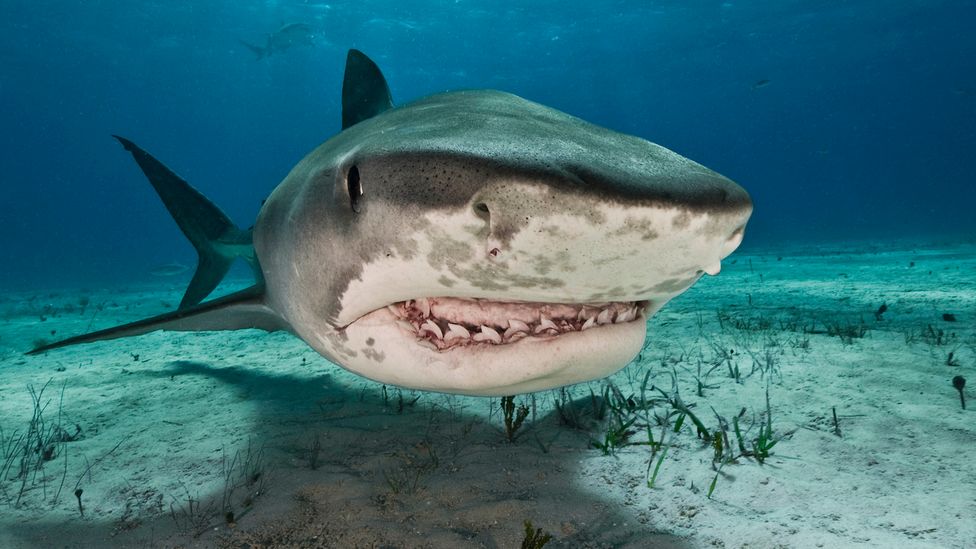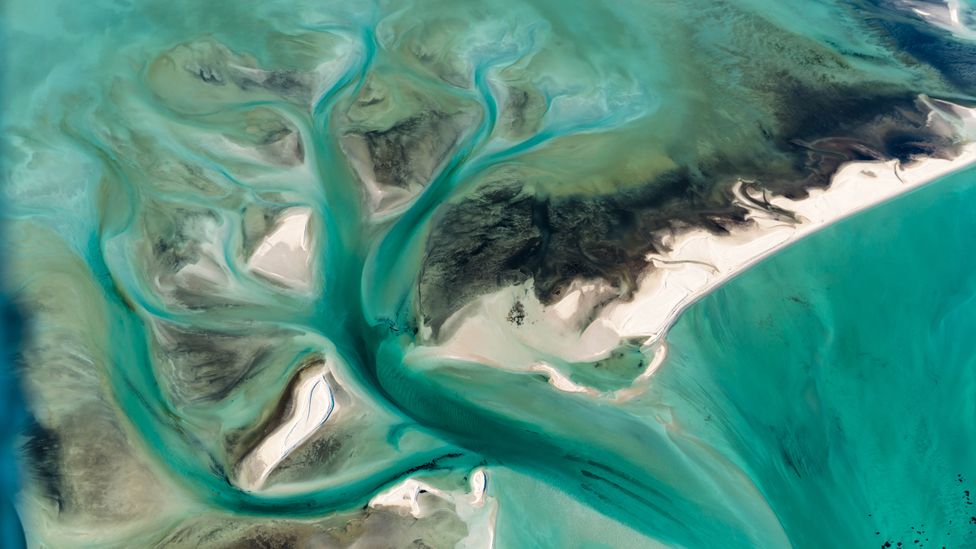
Here is a report from the BBC website:
On the westernmost tip of Australia in the aptly named Shark Bay, at least 28 species of shark swim through the clear waters and undulating seagrass meadows – the largest in the world. Tiger sharks in particular are common frequenters of the jagged inlets of Shark Bay. These mammoth predatory fish brush their 15-ft-long (4.5m) bodies through the seagrass, occasionally snatching a majestic grazing sea cow for a meal. While the presence of tiger sharks is a threat to their prey, these predators are crucial to the health of the marine ecosystem that supports both species.
In fact, despite sharks' notorious reputation among humans, they could also be a powerful ally in curbing climate change.
It all comes back to the wispy strands of seagrass that sway with the
waves in the shallows of Shark Bay. This seagrass is food for the sea
cows, or dugongs, who each graze on roughly 40kg (88lb) of seagrass a day – as well as for manatees and green sea turtles.
Off Australia's north-east coast of Queensland, tiger sharks are estimated to have fallen by at least 71%
Dugongs, which can weigh as much as 500kg (1,100lb), are a rich source of food for tiger sharks. By keeping the sea cow population in check, tiger sharks in Shark Bay help the seagrass meadows thrive. A flourishing seagrass meadow stores twice as much CO2 per square mile as forests typically do on land.

Shark Bay experienced an intense heatwave in 2011, causing waters to rise by up to 5C for two months (Credit: Getty Images)
But globally, tiger shark numbers are declining, including some populations in Australia. Off Australia's north-east coast of Queensland, tiger sharks are estimated to have fallen by at least 71%, largely due to overfishing and bycatch. A reduction in tiger sharks means more seagrass grazing by herbivores, which means less carbon is sequestered in sea vegetation. In the Caribbean and Indonesia where shark populations have dwindled, overgrazing by herbivores like sea turtles is already a profound threat to seagrass habitats, and has led to a 90 to 100% loss of seagrass.
As well as meaning less carbon is absorbed, the loss of seagrass also makes the habitat less able to recover from extreme, climate change-driven weather events, such as heatwaves.
Shrinking shark numbers
There
is clear evidence that shark populations are declining the world over,
and humans are largely to blame. A recent reassessment by the IUCN Red
List found that 37.5% of all shark and ray species are now threatened
with extinction. Catherine Macdonald, marine conservation biologist and a
lecturer at the University of Miami, points out that oceanic sharks and
rays have declined in abundance by 71% since 1970.
Overfishing is
their biggest threat, but loss of coastal habitats, prey loss and
declines in water quality are also contributing factors.
One of Western Australia's worst heatwaves hit in 2011, with ocean temperatures rising by 5C for two months. The heatwave was catastrophic for the bay's dominant species of seagrass, Amphibolis antarctica, which forms rich, dense meadows that hold sediments and provide food for grazers. More than 90% of the Amphibolis antarctica was lost, the largest loss known across the bay.
This loss of seagrass was, perversely, a treat for the bay's sea cows, who love a smaller and harder-to-find type of tropical seagrass that was ordinarily shielded from access by the tall, dense Amphibolis antarctica. When tropical seagrass is more accessible, sea cows in their enthusiasm are known to forage for it in a destructive way known as "excavation foraging", digging up the rhizomes of their preferred seagrass, and making it harder for dense Amphibolis antarctica beds to reform.
In Shark Bay, the tiger sharks were somewhat able to restore the balance by keeping sea cow numbers down, and not all the bay's seagrass was lost. But it begged the question: What if sharks were absent from the bay – would the Amphibolis antarctica dominated ecosystem survive?
To find out, researchers led by Rob Nowicki of Florida International University, spent time in Eastern Australia, where shark numbers were lower and sea cows grazed largely undisturbed. There, divers went down and plucked the seagrass, simulating the sea cows' grazing when there are no predators to stop them – the enthusiastic, destructive excavation foraging. Sure enough, they observed a rapid loss in seagrass coverage, particularly of Amphibolis antarctica, and the ecosystem began to shift to a more tropical picture dominated by tropical seagrass.
"We learned that when unchecked, dugong grazing can rapidly destroy wide areas of seagrass when they perform excavation foraging," says Nowicki. These changes can be long-lasting. “When the seagrass recovers, the seagrass community looks different, with different species dominating than before."
Those findings underlined the role that sharks were playing in Shark Bay. "Without tiger sharks keeping the dugongs in check, the bay would likely convert to mostly tropical seagrasses," says Nowicki.
Let´s hope that the world wakes up properly and not just drowsily like it is now and really take a long hard look and make changes. I am not talking just about companies and governments but about all of us. Everyone alive today has some part to play in making changes, even really small ones to help put the brakes on.
Here on Menorca we have measures in place to preserve the poseidon grass that protects our ocean around the island. Unfortunately this year we had a ridiculous amount of boats around the coastline, which did nothing to help. It is not a problem if they realise their part in the maintenance and destruction of this vital sea grass,but many of them have no idea, as they turn up on their massive boats, without a care in the world and because they have nothing to do with the day to day running of it, don´t even think about where all the waste is going. There is a campaign to limit the amount of boats but obviously this needs to be controlled and Menorca must do this if we are to keep this island of biosphere status.
The blog song for today is: " Seven Seas of Rye" by Queen
TTFN
The blog song for today is



No comments:
Post a Comment